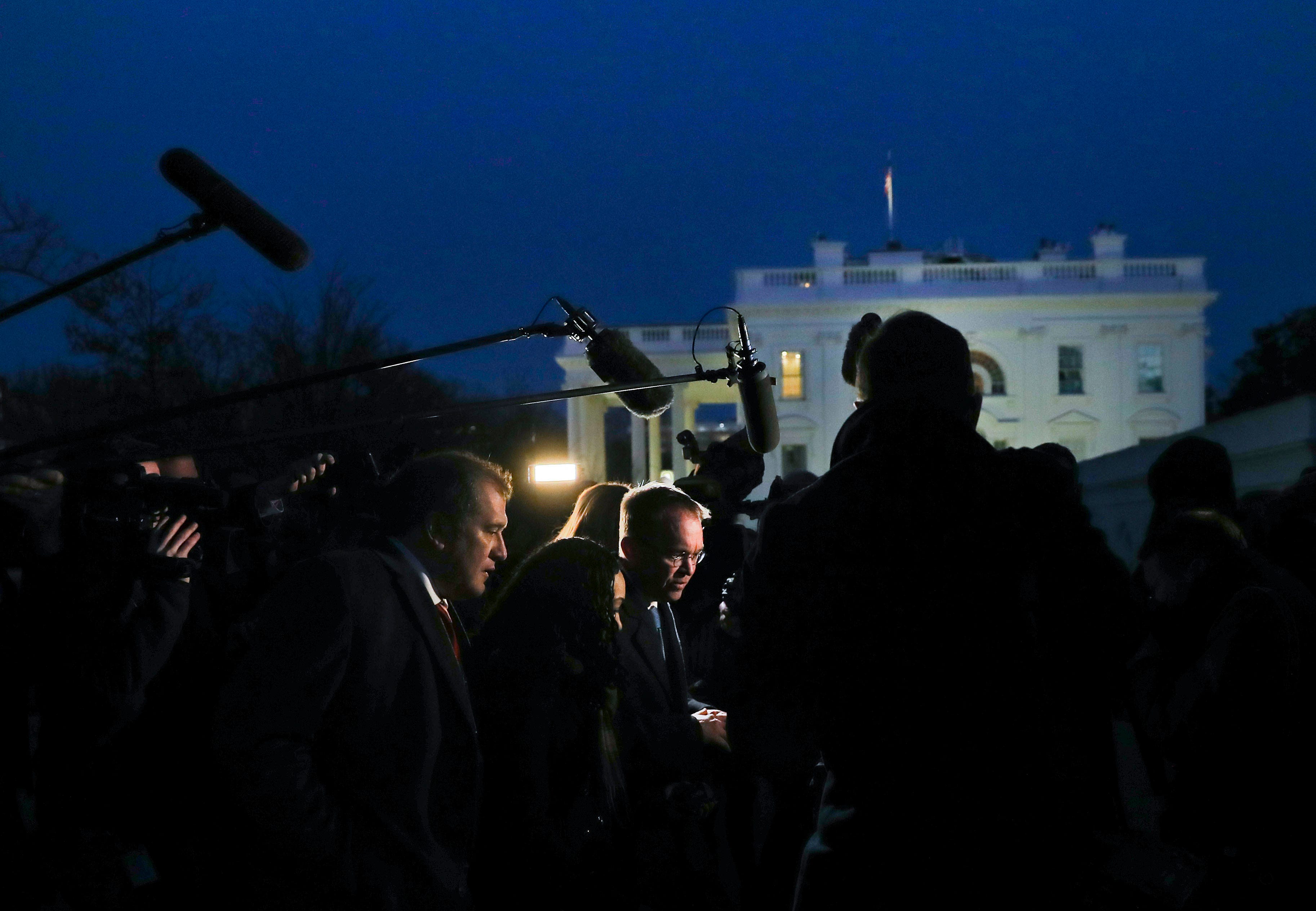
WASHINGTON — The White House was preparing for at least a weekend-long partial government shutdown Friday night, expressing little confidence that Congress could pass a bill by the midnight deadline to keep the government open.
"Not looking good for our great Military or Safety & Security on the very dangerous Southern Border," Trump said on Twitter, less than three hours before government spending authority expired, just before a scheduled Senate vote that gave little cause for optimism.
Trump canceled a scheduled trip to his Palm Beach resort on Friday as he met with the top Senate Democrat to try to forge a deal to keep the government open past a midnight deadline.
"He's not leaving until this is finished," said Mick Mulvaney, Trump's budget director. A former congressman from South Carolina, Mulvaney said he thought it was unlikely that both the House and Senate could get enough lawmakers to pass the same version of a bill Friday night.
More: Senate still plodding toward shutdown with no deal as midnight deadline looms
If there is a shutdown, Mulvaney said, the closures would inflict less pain on citizens who use government services than the last time Congress failed to pass a spending bill in time. The 2013 shutdown closed down many government functions for 16 days until House Republicans relented on their demands that a spending bill include a repeal of the Affordable Care Act.
"We want to make folks understand that it will look very different than it did under the previous administration," Mulvaney said. "The Obama administration weaponized the shutdown in 2013."
Republicans in 2013 complained that the Obama administration went further than necessary, even putting temprary fencing around the National Mall, an open, grassy park that stretches from the Capitol to the Lincoln Memorial.
Mulvaney said he is encouraging agencies to transfer funds and use other appropriations in order to remain open. At least 26 federal agencies updated their shutdown contingency plans Friday in order to make the closures less onerous.
For example: Mulvaney said national parks would remain open during a shutdown — although the trash wouldn't be picked up and park police wouldn't get paid unless Congress passes retroactive legislation. Mine safety inspections will continue, and employees will be called back next week to process paychecks for federal employees whose pay period ends Friday.

The Trump administration's approach, if carried out, would be a reversal from the so-called "Washington Monument" strategy that administrations of both parties have used since shutdowns became more common during the Reagan administration. By closing some of the most popular and visible government services, the administration can put pressure on Congress to compromise.
White House officials said they were working on that compromise Friday, with Trump personally making phone calls to Capitol Hill.
Trump invited Senate Minority Leader Chuck Schumer, D-N.Y., to the Oval Office Friday for negotiations. Senate Democrats, who have enough votes to filibuster any bill, are seeking provisions to allow immigrants who were brought to the United States as children to remain in the country.
Noting that the GOP-controlled House passed a temporary funding bill Thursday night, Trump said Friday morning that "now Democrats are needed if it is to pass in the Senate — but they want illegal immigration and weak borders. Shutdown coming?"
More: Pentagon readies to shutter offices; troops to keep fighting without pay
More: Open or closed? Here's how a government shutdown could impact you
He added, alluding to the coming elections, "we need more Republican victories in 2018!"
Republicans control the Senate, but fall nine votes short of the 60 they need to avoid a Democratic filibuster.
Mulvaney put the odds of a government shutdown Friday morning at 50% — up from 30% on Thursday. The Office of Management and Budget is responsible for coordinating and enforcing a shutdown, which would send all non-essential federal workers home unless they're funded outside the annual appropriations process.
The White House itself, as a constitutional office, would remain open for business. All presidential appointees would remain on the job, with 152 of 371 West Wing employees reporting for duty. In the executive residence, 21 of the 77 employees who help run the mansion would report to work.
The president's weekend at his Mar-a-Lago resort was scheduled to be a bigger spectacle than his usual golf weekends at what he calls the "Winter White House." Trump had planned to celebrate the one-year anniversary of his presidency with a party and fundraiser.
But Trump himself clearly sees political advantage in a shutdown for which he could blame Senate Democrats.
More: Then and now: See President Trump's evolving views on government shutdowns
Democrats and some Senate Republicans object to the House-approved spending plan for a variety of reasons.
Many Democrats want it to include authorization of a program designed to block deportation of people who were brought to the United States illegally by their parents. Trump has vowed to end the the Deferred Action for Childhood Arrivals (DACA) program unless Congress comes up with a legislative fix.
"We would like to keep the government open. What we'd really like the Democrats in the Senate to do is tell us why they don't like the bill," Mulvaney said. By including non-spending issues in the negotiations, he said, Democrats are doing the same thing they accused Republicans of when House Republicans refused to pass a spending bill that didn't include a repeal of the Affordable Care Act.
Others note that the House spending bill funds the government only up to Feb. 16, and that Congress will simply re-litigate these issues again next month unless they are dealt with now.
More: House passes short-term spending bill, but legislation faces long odds in Senate
More: Trump's first year: President spent 38 weekends at his own properties
If the Senate is unable to pass a spending plan, parts of the government will shut down at midnight. A shutdown would not affect the military or other essential services.
Contributing: Eliza Collins and Deirdre Shesgreen.

